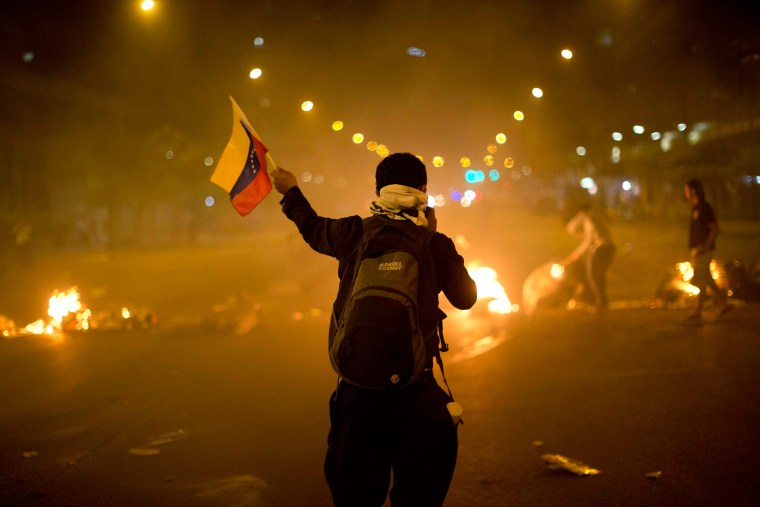The world's attention has turned this week to Kiev, Ukraine, which is now reportedly in the hands of demonstrators. But another poltical crisis has been roiling in Caracas, Venezuela, where protesters are calling for President Nicolas Maduro to step down.
At least six people have been killed in clashes between protesters and security forces, according to Reuters. The unrest, which started as a student demonstration against Marduro, has centered on frustration over the country's high crime rate, inflation and a shortage of basic household items.
Here are five things to know about what’s happening right now in Venezuela:
- Oppposition leader Leopoldo Lopez is currently jailed in Ramo Verde prison, in Caracas. He is calling for his supporters to continue demonstrating peacefully against Venezuelan President Nicolas Maduro. “I’m fine, I ask you not to give up, I won’t,” he said in a note from jail, according to Reuters. He added, "To the police, soldiers, prosecutors and judges: do not obey unjust orders, do not become the face of repression. To the youth, to the protesters, I ask you to stay firm against violence, and to stay organized and disciplined. This is everyone's struggle."
- Despite accusing the United States of inciting unrest, President Maduro is calling on President Obama to begin talks. "Accept the challenge and we will start a high-level dialogue and put the truth on the table," Maduro said at a press conference Friday.
- Journalists are receiving mixed messages from Maduro. A CNN team was told they would be removed from the country if they didn’t “rectify” how they were covering the protests. Maduro later reversed his decision, telling the journalists they could stay and cover the protests in a “balanced way.” The Committee to Protect Journalists has called on the Venezuelan government to ensure safe press access in the country. More than a dozen reporters have been injured covering the protests, according to the group, and several journalists have been arrested.
- Some Venezuelans are reportedly without Internet, and some are experiencing blocked sites, according to the Associated Press. Authorities have cut service to towns like San Cristobal. According to U.S.-based mobile app company Zello, Venezuela’s state-run telecom company CANTV has blocked access to a walkie-talkie app that demonstrators have used to help organize protests.
- Protestors remain divided over their objectives, with many not backing Leopoldo Lopez or other politicians. Can an opposition with varying goals force the current government from power? And will that government step down before the violence worsens? Center for Economic and Policy Research co-director Mark Weisbrot told the Christian Science Monitor: "Is there a government in the world that would step down just because there are a lot of people calling for change? No, it doesn’t happen. They don’t just resign. There has to be violence.”
